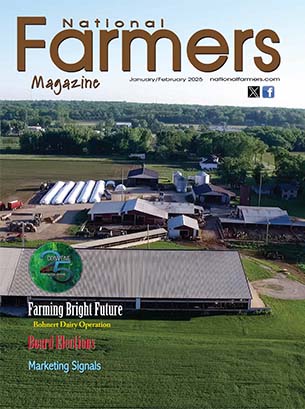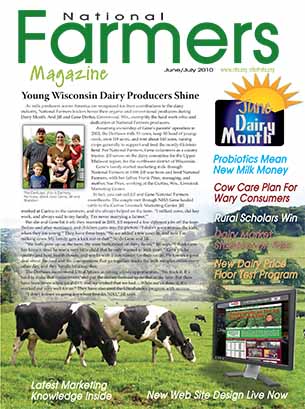Convene ’23 Commodity Reports
Real Opportunities Ahead for Cattlemen and Women
Excited about current marketing opportunities for cattlemen and women, Paul Lampert, livestock marketing director, and Jeff Rose, cattle contract manager, addressed the National Farmers members gathered in Bettendorf, Iowa, on March 8, for Convene ‘23.
The reduction in U.S. cattle herd size has pushed markets higher than we have seen in some time. “We currently have the lowest cow/calf crop on record since 1962,” Lampert said. “The most recent report stated there were 11.7 million cattle on feed. While many are comparing this year to 2014, we have 1.5 million more head on feed than we had in 2014.”
The same report estimated that producers retained 6% fewer replacement beef heifers this year. Five percent fewer beef heifers are expected to calve during 2023 and the feeder cattle and calf supplies reflect a four-year decline.
While markets have been good, Jeff Rose cautioned that world events can impact markets quickly. The pandemic, war with Russia and Ukraine, problems with China, mad cow disease in Brazil, and drought lingering in much of the west and South America will affect markets he noted.
The U.S. cattle inventory shows a four-year decline, with beef cow numbers 1 million head below last year. However, declining cattle inventory will likely translate into more imports, Rose said. Imports of cattle are forecast at 2.1 million head in 2023, up from 1.6 million head in 2022.
Lampert advised members to put pencil to paper, “figure out your break evens, and lock in a profit.” With record high prices now, Rose is continually asked when we will reach the top of the market. “Take advantage of marketing highs. Keep making a profit. Don’t swing for the fences on every load of cattle.”


Dairy Division Heralds Increase In Farms, Volume
National Farmers Dairy Division Director Bradley Rach said the organization has added to the number of dairy farms served and increased the volume of milk marketed by twenty percent last year.
“This growth builds market security, increases hauling efficiency, strengthens market access, and enables us to be more competitive,” Rach said. Looking to the future, he asked members to consider what the dairy program needs to do to stay competitive.
Rach attributed the dairy division’s success to the members, staff, and incredible business partners and then invited two of those partners to speak — Miranda Lies, Organic Valley senior director of dairy handling and procurement, and Daryl Martin, Finger Lakes Milk Co-op chairman. Both individuals pointed to the challenges overcome in the last few years and expressed excitement to be working with National Farmers members.
One of the biggest concerns facing the future of the dairy industry is consolidation, both at the farm level and on the production side. Dr. Richard Levins, agriculture economist and dairy consultant, noted that the U.S. lost 6% of its dairy farms in 2022. The smaller and mid-sized processing plants are also being pushed out of business.
Dick Byslma, national milk sales director, presented information about the Federal Milk Marketing Order system (FMMO). While he agrees fewer government regulations are typically a good thing, where milk is concerned, the regulations are needed, Byslma said. “The Federal Milk Order system guarantees an orderly market, improves income for farmers, supervises sales to ensure both farmers and processors are paid fairly, and assures consumers have adequate supplies of quality milk at reasonable prices.”


World Issues Impacting Grain Marketing Now
Grain division acting director Harold Walker led several grain division speakers who updated listeners at Convene ’23.
Teresa Seiler spoke about grain sales, reminding producers of the factors beyond their control that influence markets and underscored each member should have a marketing plan. While weather, input prices, and even wars and pandemics influence the market, a plan helps you understand where you are and how to get to where you want to be, Seiler said.
Grain committee member Mark Manford recalled some of the recent difficulties farmers have had to overcome in the past year. “World issues impact our prices,” he recalled. “South America is in a drought, and it’s being felt in Argentina. However, Brazil is having a record harvest, which is impacting our exports and the market.”
He said transportation has been a huge issue across the U.S., however, recent rains and a wet winter in many areas across the country should help with river transportation — vital for agricultural commodities.
National Farmers crop insurance representatives Kyle Perry and Al Smith gave updates about the many programs available for members to protect their investments. “There are many options for risk management,” Perry said.
Mike Schulist, organic grain representative, spoke about the organic grain division and expanding opportunities within the organic marketplace. “We are continually searching for new opportunities for our farmers,” Schulist said.












